When you think of optimizing your health, sleep should be the first on your list. I’ve been biohacking my sleep for the past few years with simple hacks like changing my eating habits, avoiding alcohol at night, and taking a hot shower just before bed as well as with advanced technologies like blue blocking glasses, the Oura ring, or the Human Charger. During the Live Beyond Iceland experience, Kayla Osterhoff and Shawn Wells gave an amazing workshop on how to biohack your sleep, and Kirsten Flanagan distilled it beautifully into this incredibly useful article.
Keep reading to learn why and how you can optimize your sleep and health.
Nowadays, we’re all living fairly fast-paced lifestyles, always being on-the-go, whipping from one meeting to the next, travelling over several time zones or socializing late at night on a couple nights of the week. All of these things cause our bodies to need more time for recovery and create a cycle where it is difficult to get sufficient sleep. Many of us are running on the absolute bare minimum to get through the day.
You’ll find out in this article that when you make minor adjustments to your lifestyle that focus on getting better sleep, you allow yourself to go from simply surviving to thriving each day!
We have all heard that sleep quantity and quality is important, but what makes this process so crucial? There are two main reasons that sleep deprivation causes us harm:
- The brain clears out cellular garbage during sleep
- The body repairs itself during sleep
These two points seem pretty important for the health of our brain and body, right? Looking at the first reason, during the day, we are consciously and subconsciously, learning new things, creating new memories, acquiring new skills and meeting new people. During sleep, our neural networks are reorganized, and all this new information is integrated with our previous life experiences.
The second reason is that when we sleep our body is in a primarily anabolic state, meaning that our muscles have a chance to fully recover. Two hormones, growth hormone and testosterone, are released at night that help repair and grow muscle as well as reshape neural networks. It is also when your hormones rebalance, so you don’t get burnt out. This is why you feel so incredible after a solid night of sleep! Because sleep is such a crucial part in the recovery period after exercise, athletes, or those who exercise extreme amounts, tend to need more sleep than most.
On a recent remote working and biohacking experience in Iceland with Live Beyond, we were lucky enough to learn all about how to optimize sleep from Kayla Osterhoff and Shawn Wells; two incredibly smart biohackers from the USA. They went into great detail on the five most important factors that influence our sleep: light, exercise, food, supplements and sleep hygiene.
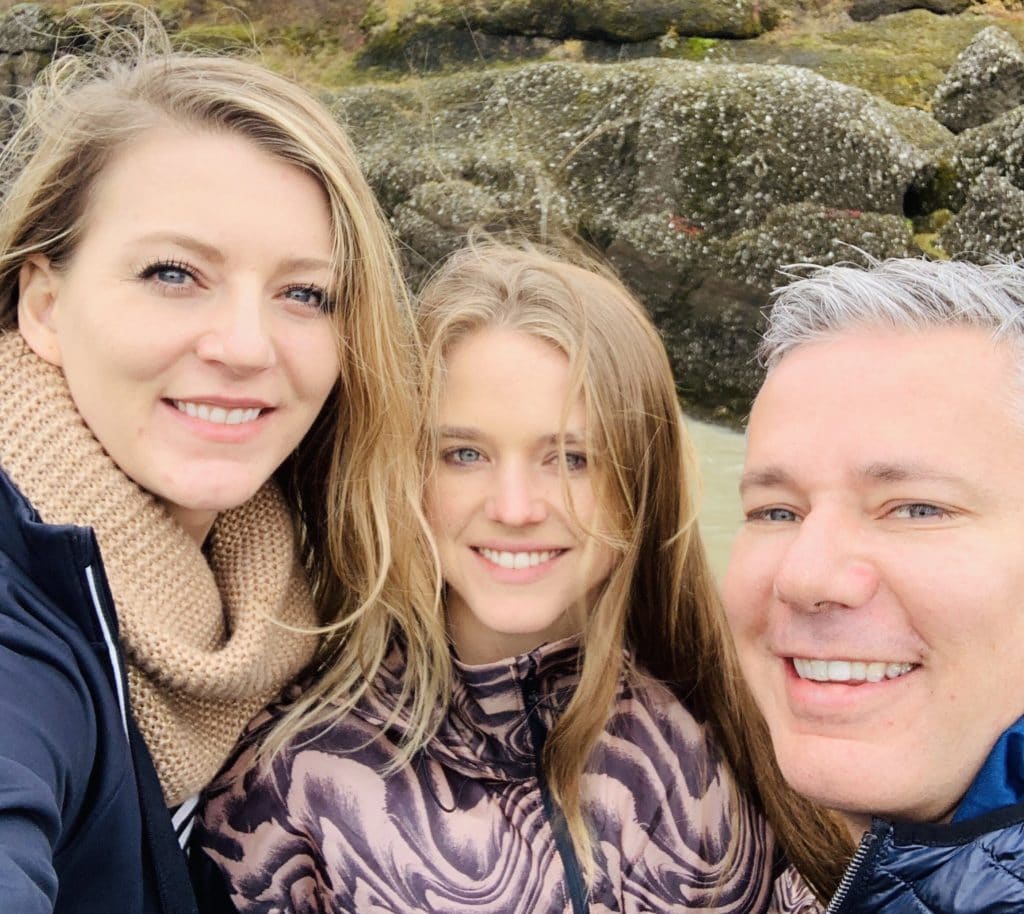
Understanding Your Circadian Rhythm
Before we get into what you can do to biohack your sleep, let’s begin by understanding the basics of your circadian rhythm. Don’t skim over this section because you “don’t like the science”! You’ll be able to make better sense of your sleep patterns and how to improve them by understanding what a typical 24-hour cycle looks like:
- Your circadian rhythm is your body’s internal clock: a 24-hour cycle in the physiological processes that regulate sleep/wake cycles, hormone levels and energy metabolism.
- Ideally, we would rise and fall with the sun, naturally syncing our 24-hour cycle with our natural environment but,
- In the real world, our perfect internal clock is disrupted by the unnatural environment we live in that is full of artificial light, EMFs, toxins, chronic stress, chronic stimulation… the list goes on!
Hormones & Energy Metabolism
Our hormones and energy metabolism are both influenced by how well our circadian rhythms are synced with the natural world. Cortisol and melatonin are only two of the hormones that regulate our bodily processes.
Briefly, cortisol – a hormone that switches on our brain and body – peaks in the morning, resulting in peak alertness between 6 and 9 am and slowly declines to its lowest around midnight. Cortisol stimulates the sympathetic nervous system, increasing our reactivity and responsiveness during the day.
Melatonin, the hormone that allows our body to sleep, is lowest during the day and begins to rise at around 6pm, reaching a peak just after midnight and falling back to baseline as we prepare to wake up in the morning. The lack of cortisol at night and rise in melatonin is what activates the parasympathetic nervous system, putting our body in a state of ‘rest and digest’ – perfect for recovery and repair.
When our internal clocks are misaligned with the natural 24-hour cycle, we wreak havoc on these hormones and our energy metabolism, resulting not only in fatigue, but a myriad of metabolic diseases!
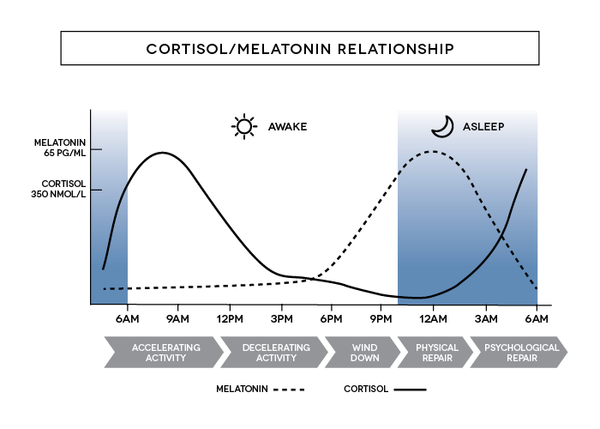
So, how can you optimize your sleep?
01 Light | Get full spectrum, natural sunlight during the day
- When you wake up, try to get 15-20 minutes of natural sunlight. This helps your cortisol levels rise in the morning and fall at night. If you can’t get sunlight, you can even use fancy light-emitting devices like the HumanCharger to peak your cortisol levels.
02 Exercise | Morning to early afternoon is best for more intense exercise, whilst low intensity exercise is best done in the evenings
- Timing your type of exercise with your circadian rhythm is key and sleep tends to be more restful and restorative when we have utilized our energy during the day light hours. For example, do HIIT or weight-lifting sessions for the morning and save yoga or long walks for the evening.
03 Food | What you eat and when you eat is essential for optimal sleep
- Only eat during daylight hours as this is when your body is ready to metabolize food.
- Practice time restricted eating (TRE). For example, allow yourself an 8-hour eating window during daytime and a 16-hour fasting window during nighttime.
- Eat a ‘whole food’ diet. The foods we eat can affect our quality of sleep. Considering the ratio of fat, carbohydrates and protein in your evening meal may be a good idea!
- Avoid eating and drinking alcohol at least 2-3 hours prior to going to bed.
04 Supplements | Sleep quality and quantity can be optimized by supplementing with targeted nutrients
- Magnesium: a mineral that is important in the production of endogenous melatonin. The most absorbable forms include citrate, glycinate, taurate or aspartate. Avoid less bioavailable forms like magnesium carbonate, sulfate, gluconate and oxide.
- Alpha-GPC: this is a great source of choline, which is essential for optimal brain function and recovery during sleep.
- L-theanine: found in green tea, helps to reduce stress and increase relaxation by lowering sympathetic nervous system activation and reducing cortisol levels too – perfect for sleep!
- 5-HTP/Tryptophan: when levels of tryptophan are increased, more of it can cross the blood brain barrier where it can get converted into melatonin.
- B-Vitamins/Methylcobolamine: these contribute to the synthesis of melatonin and serotonin, helping the onset of sleep.
- Melatonin: effective doses vary among people and excessive supplementation can have negative consequences.
05 Sleep Hygiene | Optimizing your sleep environment and timing can improve your sleep a great deal – Probably the most important of all five!
- Adults should aim for 7-9 hours of sleep every night
- Be asleep between the hours of 11 pm – 2 am (this is when growth hormone peaks and your body maximizes repair)
- Limit blue-light after dark by wearing blue-blocking glasses (like Swanwick or Ra Optics) and avoiding using screens (TV, computer, smartphone)
- Ensure your bedroom is cold and not artificially heated
- Turn your Wi-Fi router off to limit EMF exposure at night
- Make sure your bedroom is completely dark by using blackout blinds or a sleep mask
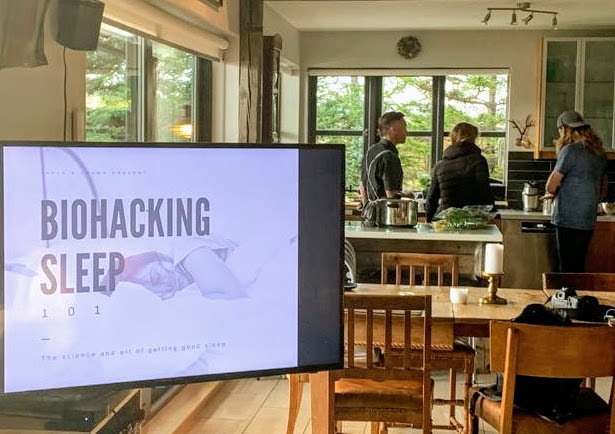
A few extra hacks that you can use to optimize your sleep at night:
- Morning cold exposure and grounding: a cold shower or a swim outdoors to stimulate the cortisol release, followed by at least 10-15 minutes of standing outside, barefoot. This ensures that your cortisol decreases enough before bedtime.
- Religious bedtime: aim to go to sleep at the same time every night. This may shift by 30-60 minutes depending on your day’s activities, but it is a good idea to ‘train’ your body to prepare for sleep.
- Evening routine: after eating dinner (at least 2 hours before bedtime), going for a post-prandial walk, or if this is not possible, to do something where you are required to move around, like wash the dishes or prepare for the next day.
- Take a hot shower right before bed: taking a hot shower rapidly raises your body temperature. As a result, your body begins to dissipate heat so that you are at an optimal ‘cool’ temperature for sleep.
- Gratitude journal for 5 minutes: before putting your head on the pillow, take a few minutes to practice some form of gratitude. The 5 Minute Journal (promo code LIVEBEYOND for 10% off) is perfect for this. This is a great way to clear the mind.
- Red/near-infrared light: ideally, make this the only source of light in your bedroom at all times after dark.
- Make the bedroom a ‘sleep only’ zone: throughout the day, try not to use your bedroom for work or other activities so that when you enter your bedroom at night, your body knows it is time for one thing only – SLEEP!
You can’t manage what you don’t measure!
Tracking your sleep biometrics could be the biggest game changer when it comes to improving your sleep. Create an N=1 experiment with yourself and test out which sleep hacks, which supplements and habits either worsen or improve your sleep. Metrics such as total sleep duration, hours of deep sleep, your resting heart rate and heart rate variability can be extremely useful in determining the quality of your sleep. A great device with which you can do this easily via immediate feedback is the BioStrap (promo code LiveBeyond15 for 15% off) or the Oura Ring.
Hopefully this gives you a better understanding of our need for sleep to function optimally both physically and mentally. I think the key takeaway here is to aim to simulate a natural environment as far as possible in this unnatural environment we live in today. Start to implement at least of few of these biohacks into your daily routine and see if you notice any improvements. Once you’re able to hack your routine to achieve an optimal night of sleep, you will feel full of energy and won’t want to change anything! Happy experimenting!
This article was written by Kirsten Flanagan, B.Sc. based on the presentation by Kayla Osterhoff and Shawn Wells.
If you want to know more about the science of sleep and different chronotypes, have a look at these articles that I wrote for the Biohacker Summit:

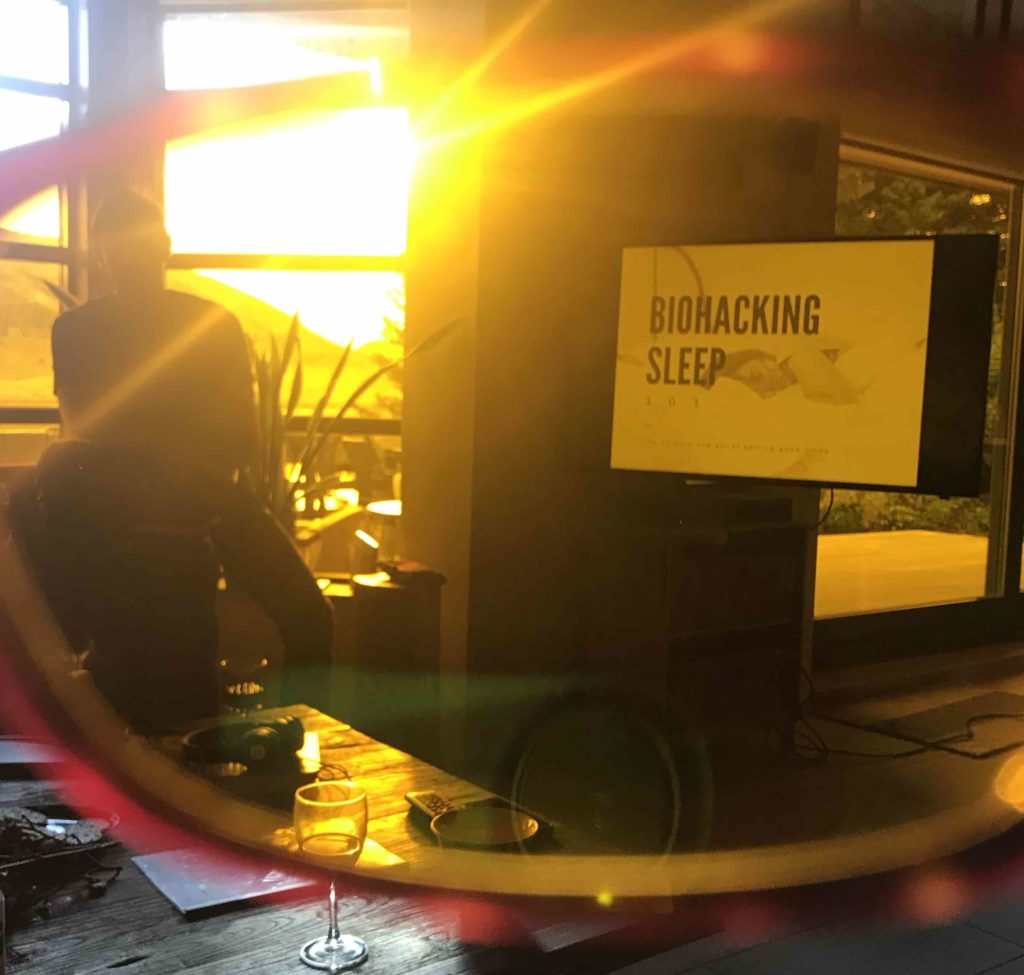

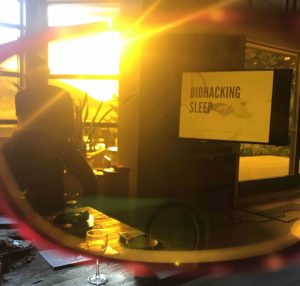

2 thoughts on “Biohacking Sleep for a Healthier Life”
Do you mind if I quote a few of your articles as long as I provide credit and sources back to your weblog? My blog is in the very same niche as yours and my users would definitely benefit from some of the information you present here. Please let me know if this ok with you. Thanks!
Sure, no problem!